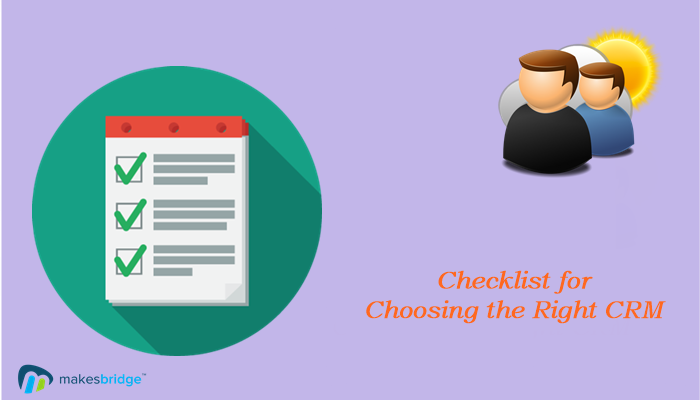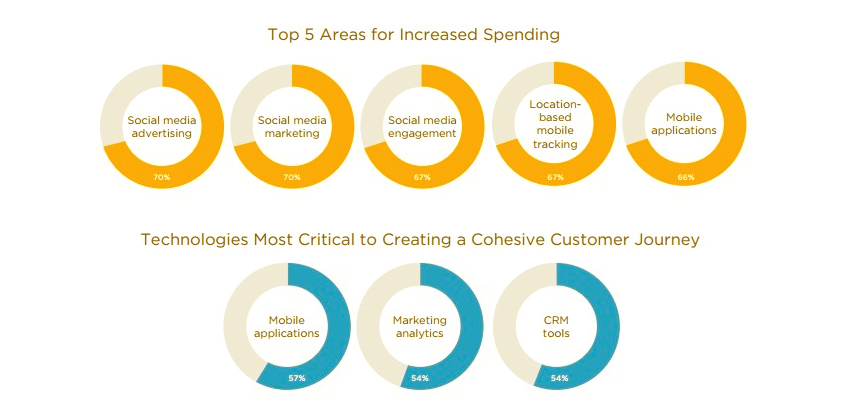Forming and keeping up relationships with clients is among the most crucial aspects of any business. Without positive relationships, it’s difficult to succeed in any industry and long-term achievement can be endangered. That is the reason it’s so invaluable to implement a customer relationship management (CRM) framework into your operations.
Selecting a CRM platform demands a lot of planning; however, while CRM tools are utilized validly, they can also be a critical driver to your organization’s success. As indicated by VentureBeat’s winter 2015 State of Marketing Technology report, “users invest more time every year in CRM and different deals Salesforce automation tools than in any other category.” The following image from Salesforce state of marketing 2015 indicates that CRM is one of the top five spending areas in marketing.
Here are five things to consider when selecting the right CRM tool for your business:
1. Customer and Industry Profile:
Studying the websites of the diverse vendors, you can get a thorough understanding of the types of organizations that a specific vendor works with, and the size of the organizations. Take a look at vendors who have worked with organizations and commercial ventures which are like yours. Consider the types of CRM solutions these vendors offer. Is it just a niche solution or is it a horizontal solution which can fit a wide range of businesses? You’ll need a vendor who can match your precise needs.
2. Align With Strategy and Process:
Having a right CRM tool won’t help your company’s strategy. Rather, a CRM platform can help automate your current strategy through notifications, proactive renewals and many more things. Before you start your selection procedure, confirm to document with all the partners your strategy and procedure. Here, make sure that your CRM works well with your marketing automation system and can easily be integrate with the same.
3.User Adoption:
Regardless of which system that you choose, there will probably be some of your team members who oppose the change. Your business acumen may feel challenged. This is a typical problem among salesmen; they frequently feel that by surrendering their clients’ contact details, they are putting their own positions at risk.
The key here is to comfort your sales representatives and assure them that they are not at risk of losing or sharing their clients with others, since they own the personal relationship with the customer. Including your sales team in your CRM selection procedure to get their input and keeping them involved from start to finish helps your sales representatives feel less threatened by a new system.
How to Convert Google Apps Into CRM?
4. Partner Network:
Most of the marketers want a local partner to offer them local support during and after the implementation of CRM. If you consider this important, you must look into the vendor’s partner channel.
- Does the vendor have local partners?
- Do these partners only implement or can they also offer business consulting?
- How much CRM experience does the local partner have, what is their certification status, and how many implementations have they been involved with?
These are extremely relevant queries and should be answered before you engage in a buying process with a potential partner.
5. Free Trial/Demo:
Depending on your skills and time, it’s a good idea to at least check out a few demos/videos to get an idea of how the system works.
The best solution is to begin with an assisted online demo and then move onto a free trial. A supported demo is the place where you let the businessperson walk you through the product and show you the way to navigate and use it. When that is done, get access to a free trial so you can play around with the new system and get a good vibe for how it works. Not all tools come with a free trial period. Try out Makesbridge first to get a free trial and then pay later!
Conclusion:
It is obvious that CRM plays a crucial part in any business’s success. It’s easy to become involved with all the wonderful things that CRM can do for a business, but be careful. The most important thing to remember when starting with CRM is to keep it simple. In this way, you will be in a position to best achieve your CRM objectives.
Related Posts:

